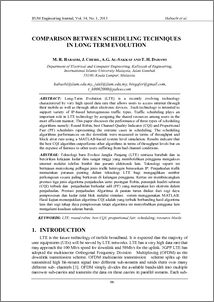Habaebi, Mohamed Hadi and Chebil, Jalel and Al-Sakkaf, A.G. and Dahawi, T. H.
(2013)
Comparison between scheduling techniques in long term evolution.
International Islamic University Malaysia Engineering Journal, 14 (1).
pp. 66-75.
ISSN 1511-788X
![[img]](http://irep.iium.edu.my/style/images/fileicons/application_pdf.png)  Preview |
|
PDF (Comparison between scheduling techniques in long term evolution)
- Published Version
Download (1MB)
| Preview
|
Abstract
Long-Term Evolution (LTE) is a recently evolving technology
characterized by very high speed data rate that allows users to access internet through
their mobile as well as through other electronic devices. Such technology is intended to
support variety of IP-based heterogeneous traffic types. Traffic scheduling plays an
important role in LTE technology by assigning the shared resources among users in the
most efficient manner. This paper discusses the performance of three types of scheduling
algorithms namely: Round Robin, best Channel Quality Indicator (CQI) and Proportional
Fair (PF) schedulers representing the extreme cases in scheduling. The scheduling
algorithms performances on the downlink were measured in terms of throughput and
block error rate using a MATLAB-based system level simulation. Results indicate that
the best CQI algorithm outperforms other algorithms in terms of throughput levels but on
the expense of fairness to other users suffering from bad channel conditions.
Actions (login required)
 |
View Item |


 Download Statistics
Download Statistics Download Statistics
Download Statistics